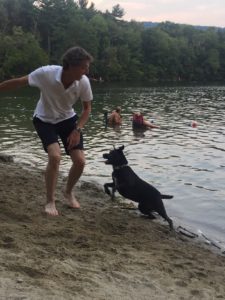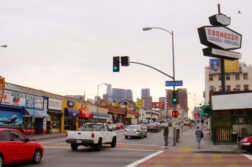NO MATTER which mask I wear—the blue-face inducing N95 sent by a nurse friend in the earliest days of the March lockdown or the all-cotton triangle that ties behind my head—I scare dogs.
Prior to having to wear such coverings, I could always win the wag of a tail or a sloppy lick across the back of my hand, maybe even a jump up, front paws against my chest. Something about the way that the lower halves of our faces are now concealed seems to spook dogs.
When I look at a dog now, I sense their wariness. Unable to read my face, absent the way my mouth contorts and activates other attendant muscles that control the configuration of my jaw and my ears, I think dogs perceive my look as more threat than affection. When I look at their eyes now, I rarely see an expression of delight radiating from them, rather, an edge of hostility or a careful questioning about my motives. I do believe that dogs smile, and when I greet a dog on the street now, I rarely get a smile back, more of a stare down. And I look away. I have to. I neither want to scare the dog nor endanger myself.

For those of us who live alone and are single, these months of not actually being with people, have resulted in a sense of isolation and alienation far more profound than I think we realize. So much so that I think it has contributed to the eagerness with which people gathered for the (in some cases, still ongoing) protests, by day and night, willing even to risk violating the curfew hours that had been set. Political causes aside, the gatherings are, frankly, chances to be together.
I say it, and I have heard friends say it: this separation from normal social commerce has felt akin to being in a prison—or what we perceive that situation to be. Maybe a low-level-security facility—with some interaction allowed, times allotted to make crafts with a glue-gun or assemble a jigsaw puzzle, but not complete freedom. We’ve been under house arrest, actually. And with the imposition of the curfew, given the ignoble looting and mayhem, it’s as if some earned privileges have been suddenly taken away because another prisoner grabbed an extra roll in the cafeteria or sassed a guard, for which we are all punished. As it is, I refer to my daily foray into the neighborhood as my prison-yard walk.
I took a ferry boat ride the other day with a good friend, Aaron. We went just across the East River to Long Island City for one of our exploration dates; we both love to seek out quirky industrials ruins, as well as bakeries. And when we returned later in the day to the 34th Street dock, each of us standing on the open deck taking photos of the Midtown Oz-like skyline as if we’d never seen it before, something so magical and humanmade, I asked a question I was afraid to ask. I was nervous about doing so, especially at dinner time on a Sunday, even though Aaron is someone I know well. We had been intimate before—twice, and yet neither of us ever mentioned it again.
“What do you think about coming over for dinner?” I asked him. “Just as we’ve so often done together,” I added, as if to remind him, in case he forgot, that such activities were once normal and safe.
Even as I was issuing the invitation, mumbled through my mask, the material puckering against and into my mouth, I was imagining the delicious scenario of Aaron sitting on a barstool at my kitchen pass-through as I cooked. He would choose an Arvo Part or Erik Satie CD to insert (such is the state of my technology). I could almost hear the squeak and pop of the wine cork he would pull, the hiss of the match as he lit some candles nestled in votives.
Aaron paused after I asked the question. From the dock, water sloshing against the pilings like a clumsy metronome, he looked across the river from where we had just come. When he turned to address me, I was unable to read his handsome face, concealed by his mask. He said that as much as he’d like to, it was just “too early still” for him to feel comfortable coming into my home. “I’m getting closer,” he said, “I’m feeling a bit more comfortable in saying yes, some day. Soon.”
Just as we are alone among ourselves in our apartments, so, too, are we alone on the street among dogs—at least those of us who don’t own one. These months of separation from people—and from dogs—have left, I believe, a deep psychological bruise. We may seem to have adapted to being alone this much, but I question that resolve. There’s a bruising going on beneath our skin.
The state of aloneness we’ve occupied is reparable, but it will take a lot of effort. Like getting back into an exercise routine at the gym and re-toning our bodies, so too, will we need to re-tone our abilities to socialize. It’s not just a matter of vacuuming the rug again and realigning the throw pillows. We’ll have to learn to reread each other’s faces.
I miss people more than anything, but I also miss the innate friendliness of dogs, their ready expression of delight in being noticed, the way they position their bodies for a petting by a stranger, both parties eager for affection.
 David Masello, a writer about art and culture, is based in New York City. Masello is a frequent contributor to The Gay & Lesbian Review.
David Masello, a writer about art and culture, is based in New York City. Masello is a frequent contributor to The Gay & Lesbian Review.





Discussion2 Comments
This was a wonderful article as it describes exactly what I am going through. As I am not alone in these feelings, this is just the perfect indication of what is going through all of us at this very moment. David Masello put into words just what most of us only thought of but could not verbalize. Thank you!
Thank you, David Masello, for your thoughtful article. I realize daily how fortunate I am to have a loving dog living with me, but can imagine the aloneness one must feel without such a devoted pet and friend.
Cyrus, my CockerPoodle, shows his gratitude that I am home so constantly because of the pandemic restrictions. However, I have used the time at home to write a new tome, A Kaleidoscope: Fragments of Memories over the Decades. Cyrus regrets my time at the computer at this time when he thought I would devote all my attentions to him. It is a learning experience for the both of us.